Exploring Naif Souq: Culture & Commerce in Dubai
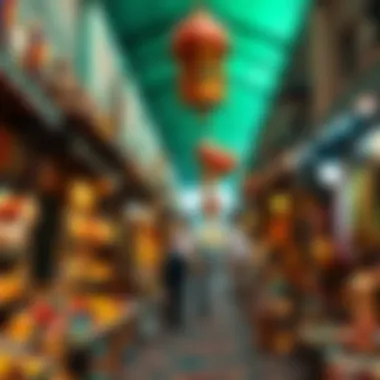
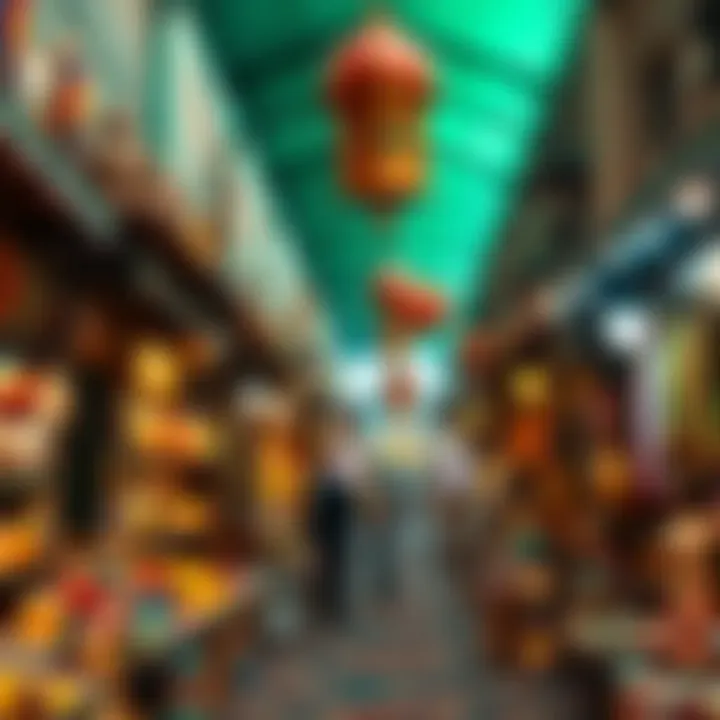
Intro
Naif Souq, nestled in the heart of Dubai, is more than just a marketplace; it is a lively tapestry of culture and commerce. Steeped in history and character, this souq serves as a quintessential representation of the UAE's vibrant heritage. As you stroll through its winding alleys, you will encounter a mosaic of sights, sounds, and smells that transport you back in time while maintaining a foot firmly planted in the present.
From traditional merchants selling spices and textiles to modern stores featuring contemporary goods, Naif Souq delights shoppers from diverse backgrounds. The bustling atmosphere draws in not only tourists but also locals, creating a melting pot of cultures.
As the world steps deeper into the twenty-first century, the souq continues to evolve, adapting to changing buyer preferences and market demands. Thus, a closer examination of this unique marketplace helps to illuminate its ongoing significance in Dubai's commercial landscape.
In the following sections, we will unpack market trends affecting Naif Souq, delve into current property prices, explore investment opportunities, and analyze future forecasts, allowing you to understand the potential this vibrant hub has to offer.
Market Trends
The commercial real estate scene in Dubai, especially around Naif Souq, is a constantly changing landscape, driven by various factors including tourism, economic shifts, and consumer behavior.
Current Property Prices
Naif Souq is situated in a prime location within the Deira district, making it an attractive spot for both businesses and investors. Recent data suggests that property prices near the souq are stabilizing, with a noticeable increase in retail spaces as demand grows. As of now, prime retail spaces in this area can fetch prices ranging from AED 1,500 to AED 3,000 per square meter, depending on various parameters like foot traffic, visibility, and proximity to amenities. It is crucial for potential investors to analyze these metrics carefully before making any commitments.
Future Forecasts
Looking ahead, experts predict a steady growth trajectory for the Naif Souq area. The government's initiatives to bolster tourism and improve infrastructure support this optimism. Lavender schemes, such as community-driven festivals that highlight local crafts, further enhance the appeal of the souq. As more expatriates move to Dubai, the demand for retail spaces is expected to increase, making it an opportune time for keen investors to enter the market.
"Investors are recognizing the untapped potential of Naif Souq. With strategic enhancements and local engagements, the future looks promising for businesses in this area."
Investment Opportunities
Understanding the investment landscape is crucial for anyone looking to capitalize on the opportunities presented by Naif Souq.
High-ROI Areas
There are several key pockets within the souq that hold considerable promise for returns on investment. Retail spaces located close to the main entrance have historically yielded higher traffic and consequently, increased sales. Additionally, areas that feature a mix of traditional and modern offerings draw a more diverse clientele, enhancing the possibility of repeat customers. Investors should explore units that capitalize on these high-traffic zones.
Financing Options
Securing financing for properties around Naif Souq is feasible, with various banks and financial institutions offering tailored packages for both local and expatriate buyers. Options range from traditional mortgages to alternative payment plans that allow for greater flexibility. Investors ought to explore different lenders, comparing terms and conditions, to find a suitable fit for their situation.
In summary, Naif Souq sits at the intersection of rich cultural experiences and lucrative investment potential. Its unique offerings continue to capture the interest of locals and tourists, while the evolving market dynamics present a compelling case for investors looking to make their mark in Dubai. Understanding these facets arms you with the knowledge to navigate this vibrant landscape and seize the opportunities that lay ahead.
For more insights:
Whether you're an investor, property agent, or just curious about the commercial vibes of Naif Souq, grasping these market trends and investment opportunities is vital to making informed decisions.
Prolusion to Naif Souq
Naif Souq stands as more than just a maze of stalls and shops; it’s a vital piece of Dubai's identity, blending the city's deep-seated traditions with a modern commercial environment. Located near the bustling Deira district, the souq encapsulates the essence of Dubai’s heritage while serving as a vibrant marketplace for both locals and visitors alike.
Through this exploration, it is essential to appreciate the role that Naif Souq plays in not only preserving cultural legacies but also in fostering economic growth. For expatriates and investors, understanding this nexus between culture and commerce is crucial. Naif Souq represents a microcosm where history meets the hustle of trade, creating an atmosphere that is lively, engaging, and full of stories.
In this introduction, we will delve into several key aspects of Naif Souq:
- Historical Context: Understanding the beginnings of Naif Souq helps to grasp its significance in the contemporary landscape of Dubai.
- Cultural Fusion: The souq not only sells goods but also promotes a blend of traditions that resonate with the diverse populace.
- Economic Impact: The bustling market helps in driving local economies, providing jobs and supporting small businesses.
- Visitor Experience: It’s a place where tourists can immerse themselves in the local culture while enjoying a unique shopping experience.
Overall, Naif Souq is not merely a marketplace but a cultural hub that embodies the principles of community, diversity, and enterprise in Dubai. Its significance reverberates through the local economy and cultural landscape, making it a compelling topic of discussion and exploration.
Historical Significance of Naif Souq
Naif Souq serves as more than just a shopping destination; it stands as an enduring symbol of Dubai's rich past and its dynamic future. The souq's historical significance can be understood through its origins, development, and cultural implications. It embodies the essence of traditional Emirati commerce while evolving alongside the bustling metropolis of Dubai.
Origins and Development
The roots of Naif Souq can be traced back to the early days of Dubai when it began as a small trading post. Established in the 1940s, it was originally a modest marketplace frequented by local vendors. Over the years, as Dubai transformed from a sleepy fishing village to a thriving commercial hub, Naif Souq adapted to meet the needs of both residents and incoming expatriates.
In the 1950s, the souq's strategic location close to the Dubai Creek facilitated trade and bolstered its importance in the local economy. Vendors selling textiles, spices, and local handicrafts set up shop, creating an atmosphere rich in vibrant trade and cultural exchange.
The physical structure of Naif Souq has undergone several transformations, especially during major renovations in the early 2000s aimed at modernizing the space without compromising its traditional allure. Such developments attracted a more diverse clientele, increasing foot traffic and broadening the souq’s appeal.
Cultural Heritage and Evolution
Naif Souq stands as a testament to the cultural heritage of the UAE. Its narrow lanes and bustling stalls resonate with the history of commerce in the region. The marketplace is not just a shopping center; it is a vibrant tapestry of Emirati life reflecting a blend of old and new.
Some visitors might say walking through the souq feels like stepping back in time. The aromas of spices fill the air, and the sounds of merchants calling out to passersby create a lively ambiance. Such interactions are not merely transactional; they represent a form of social engagement—cultural exchange happening right on the shop floor.
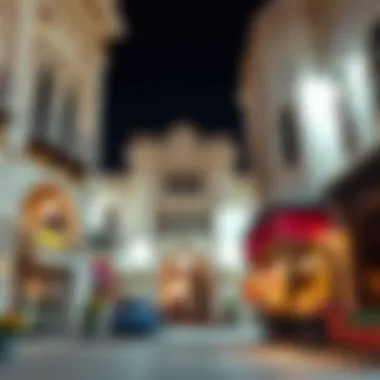
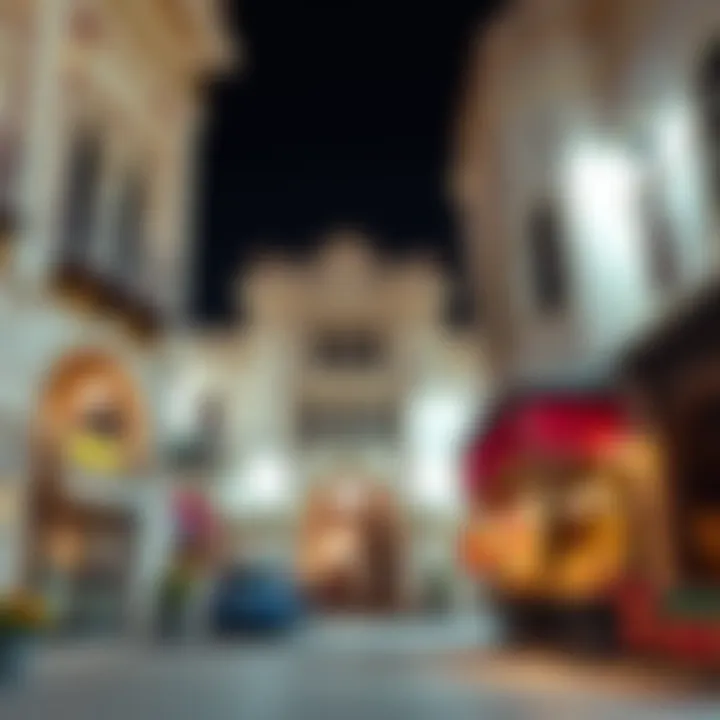
Moreover, Naif Souq has evolved to embrace a more cosmopolitan identity, where traditional crafts exist alongside modern goods. The influx of tourists and expatriates has created a melting pot of cultures, fostering an environment where local artisans collaborate with international influences.
In sum, Naif Souq is a microcosm of Dubai itself, illustrating how a site steeped in history can adapt and thrive amidst rapid modernization. The souq not only contributes to the local economy but also preserves and showcases the rich cultural narrative of a city that stands at the crossroads of tradition and innovation.
"Naif Souq is where the past dances with the future, offering a glimpse into the heart of Dubai's commercial spirit."
As we continue to explore further aspects of Naif Souq, it becomes clear that this marketplace is a critical piece of the puzzle in understanding Dubai's unique identity—both yesterday and today.
The Architecture of Naif Souq
The architecture of Naif Souq goes beyond mere aesthetics; it's a vital component that reflects both the cultural essence and the practical functionality of this vibrant marketplace. Nestled in the heart of Dubai, the design of Naif Souq is steeped in traditional styles, yet is not shy of embracing modern elements. This synthesis not only enhances the shopping experience but also offers a peek into the soul of Dubai’s rich history and lively present. Understanding its architectural significance provides valuable insights for potential investors and visitors alike, revealing a space where commerce and culture flourish side by side.
Traditional Design Elements
At the core of Naif Souq’s charm are its traditional design elements. From the moment you step through the entrance, you're greeted with arched doorways, intricately carved wooden beams, and a labyrinth of narrow alleyways echoing an age-old marketplace atmosphere. These features serve multiple purposes:
- Cultural Resonance: The architectural choices reflect local customs and traditions, creating a sense of place deeply ingrained in Emirati heritage. The decorative motifs often showcase elements of Islamic art, which resonate with both locals and tourists.
- Functional Design: The open-air layout maximizes airflow, allowing for natural ventilation that cools the space and makes shopping comfortable even in the sweltering heat of summer.
- Material Usage: Predominantly constructed from local materials such as coral stone and plaster, the souq's structure blends seamlessly into its environment. This choice not only stems from practicality but also from sustainability practices rooted in the region's history.
Rich in character, these traditional elements not only transport visitors to a bygone era but also create a space where stories unfold—whether it's a merchant sharing tales of his trade or a family gathering around a sumptuous meal.
Modern Enhancements and Renovations
While preserving its heritage is paramount, Naif Souq has also undergone significant modern enhancements. These renovations aim to elevate the shopping experience without overshadowing the souq's historical significance. Some notable aspects include:
- Infrastructure Improvements: Recent refurbishments have introduced better lighting and signage, helping visitors navigate the market more efficiently. This not only encourages a smoother shopping experience but also increases foot traffic as the souq becomes more inviting.
- Technology Integration: The introduction of digital payment systems and E-commerce capabilities allows vendors to reach a broader customer base. Now, alongside bargaining for textiles and spices, one can pay through mobile apps, seamlessly blending tradition with modernity.
- Accessibility Features: Enhancements have made the souq more accessible to all visitors, including ramps and wider pathways, which ensure that everyone can partake in the vibrant culture and offerings the souq has to share.
The careful balance between modern enhancements and traditional elements is what makes Naif Souq more than just a shopping destination; it is a living heritage site that bridges the past and future.
Ultimately, the architecture of Naif Souq encapsulates the essence of Dubai's evolution. It stands as a testament to how a marketplace can evolve without losing its identity. Potential investors should take note of these architectural dynamics, as they significantly impact shopper engagement and overall market viability in the heart of Dubai.
Shopping Experience at Naif Souq
The bustling Naif Souq offers a vibrant shopping experience that is not just about purchasing items, but about immersing oneself in the atmosphere of cultural exchange. This multifaceted marketplace is a blend of traditional flair and modern convenience, making it a focal point for both locals and visitors. Understanding the shopping experience here begins with recognizing the significant elements that set Naif Souq apart from other retail spaces in Dubai.
Product Diversity
Shoppers are often drawn to Naif Souq because of the immense diversity in products available. Each section of the market presents a plethora of goods that are not only unique but also rich in character and history.
Textiles and Fabrics
The stalls overflowing with textiles and fabrics stand as a testament to Dubai's thriving craftsmanship. The souq is known for its vibrant colors and intricate designs, appealing to fashion enthusiasts and home decorators alike. Visitors might find everything from shimmering silks to rich cottons, each telling its own story about craftsmanship and culture. This availability makes textiles a popular choice among tourists looking to bring home a piece of local culture. However, the competition among sellers can sometimes lead to overinflated prices, so haggling is often a required skill when embarking on a shopping adventure here.
Traditional Handicrafts
The section dedicated to traditional handicrafts offers items that are steeped in history. Visitors can find beautifully crafted artifacts, from pottery to intricate metalwork, all showcasing the artistry of local artisans. Each piece often reflects the rich heritage of the UAE. These authentic handicrafts not only serve as great mementos but also support the local economy. However, buyers must remain cautious, as the quality can vary widely. Taking time to evaluate the craftsmanship is crucial before making a purchase.
Perfumes and Spices
Naif Souq's perfume and spice vendors create an olfactory paradise that draws customers with their enticing aromas. Traditional Arabic perfumes, known as oud or bakhoor, can be found alongside a variety of spices that are indicative of the region's culinary heritage. The allure of these scents is enhanced by the possibility of customizing fragrances, which adds a personal touch to the shopping experience. However, it’s wise for buyers to familiarize themselves with typical scent profiles to avoid purchasing products that do not meet their expectations. The chance to negotiate these items adds another layer to the shopping experience, making it more interactive and engaging.
Interpersonal Commerce
Shopping at Naif Souq is about more than just the products; it’s about the personal connections that form throughout the process. Sellers often greet patrons with warmth and friendliness, fostering an environment where dialogue and transaction are intertwined.
In this atmosphere, haggling goes beyond merely negotiating a price; it becomes a form of entertainment. It encourages interaction between buyers and sellers, allowing each party to engage in light-hearted banter while negotiating. This social commerce contributes to a unique cultural experience that technology-based shopping lacks. Buyers leave not just with merchandise, but stories and experiences that they happily take back home.
The blend of rich product diversity and interpersonal commerce at Naif Souq makes the shopping experience unforgettable for anyone who walks its vibrant aisles.
Culinary Offerings within Naif Souq
When one thinks of markets like Naif Souq, it’s not just about shopping; it’s about diving headfirst into a culinary adventure that intertwines with the local culture. Here, food isn’t merely sustenance; it embodies history, tradition, and communal life. In the buzzing lanes of the souq, each bite tells the story of Dubai’s diverse influences and culinary heritage. This section will navigate through the culinary landscape of Naif Souq, highlighting its street food culture and various dining options to understand how these contribute to the overall experience of this vibrant marketplace.
Street Food Culture
Street food at Naif Souq is a reflection of the bustling life that permeates this historic market. Vendors line the roads with their colorful stalls, offering an array of dishes that tantalize the senses. From savory shawarmas to steaming bowls of biryani, the choices seem endless.
The allure of street food lies not only in its flavors but also in the experience it offers. The mingling of locals and tourists creates an energized atmosphere that enhances the enjoyment of the meal. Each meal becomes a personal encounter, made noteworthy by the stories shared by merchants who often know their regular customers by name, making every transaction feel personal and welcoming.
Moreover, street food provides an affordable way to taste the richness of Emirati spices and culinary techniques. From fresh falafel balls bursting with flavor to sweet kunafa served warm, the variety appeals to everyone. Eating amidst the vibrant chatter and smells of spices creates a unique, immersive experience that enhances the market visit. Thus, street food not only highlights the flavors of the region but also serves as a social connector, drawing together people from all walks of life.
Dining Options
Traditional Cafes
Traditional cafes in Naif Souq are a treasure trove of local flavor and culture. These quaint spots offer more than just a meal; they provide a slice of Emirati hospitality. Characterized by their cozy atmospheres and traditional décor, these cafes invite diners to take a break from shopping and enjoy a cup of Arabic coffee or a fresh mint tea.
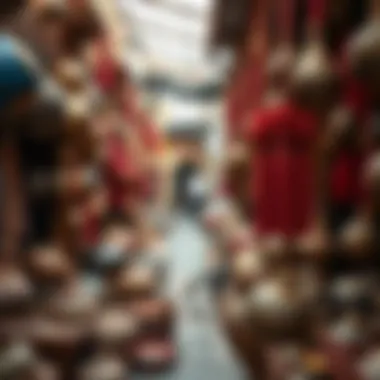
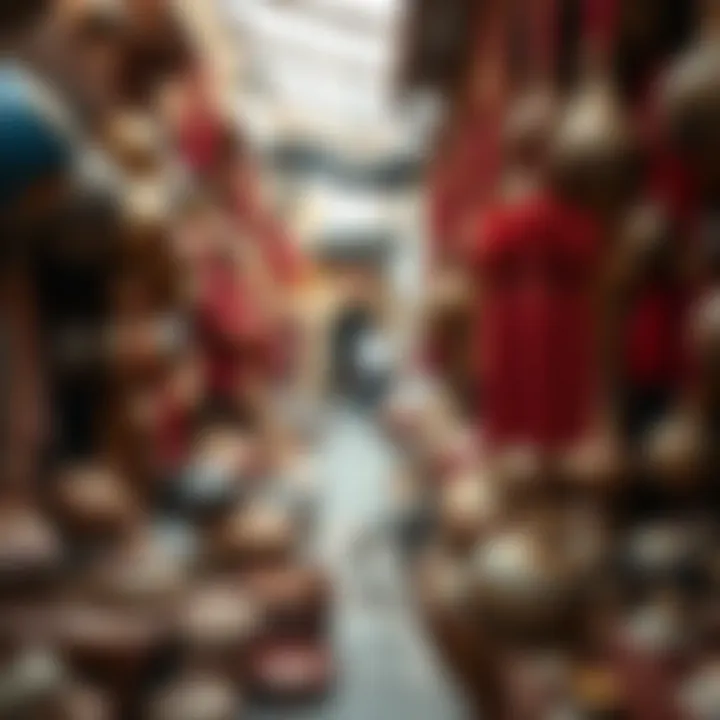
One key characteristic of traditional cafes is their simple yet delightful menus that feature local favorites such as hummus, foul medames, and samosas. The warmth of Arabic hospitality complements the offerings, ensuring each visitor leaves with not just a full belly but also a heart warmed by local tradition. The unique setting often includes low seating and decor reflecting the rich culture, making it a popular choice for those wishing to immerse themselves fully in the atmosphere of Naif Souq.
However, while these cafes shine for their charm and traditional dishes, they may sometimes lack the variety one finds in more modern eateries. Still, they remain a beloved aspect of the dining experience here, providing authenticity that many seek when visiting the souq.
Modern Restaurants
In contrast, modern restaurants in Naif Souq introduce a contemporary flair to the culinary scene. These establishments blend traditional flavors with chic presentations, catering to a diverse clientele looking for something a bit more upscale. Often featuring fusion dishes, they stand out by drawing on various culinary influences while respecting the roots of Emirati cuisine.
One defining characteristic of modern restaurants is their ability to adapt to shifting consumer preferences, offering vegan options and international dishes alongside classic fare. This adaptability makes them a popular choice for expatriates and tourists who wish to experience familiarity while also delving into local flavors. The dining environment is typically more polished and stylish, making it suitable for those looking to have a relaxed dining experience after a day of bustling market activity.
Nevertheless, while these restaurants might impress with their aesthetics and innovation, some patrons might miss the authentic feeling of the traditional cafes. Finding balance in both culinary traditions ensures that Naif Souq remains a place where all tastes may find satisfaction.
Overall, the culinary landscape of Naif Souq is a multifaceted representation of Dubai's diverse cultural fabric, offering visitors an authentic taste of the region's culinary heritage while accommodating contemporary preferences. Whether indulging in the vibrant street food scene or sitting down in a traditional cafe or modern restaurant, patrons will find that each dining experience reflects the soul of Dubai, echoing stories of its past and present.
Visitor Demographics and Behavior
Understanding the demographics and behaviors of visitors at Naif Souq paints a vivid picture of its unique cultural tapestry and economic impact. Visitors flock to this marketplace for various reasons. Some are drawn by traditional goods, while others seek an immersive cultural experience. Analyzing these dynamics helps businesses and investors alike tailor their offerings to cater to a diverse audience.
Local vs. Tourist Dynamics
The interplay between local residents and tourists at Naif Souq creates a fascinating dynamic. Locals tend to frequent the souq for its everyday purchases—spices, textiles, and fresh produce are common sights. They value the quality and authenticity of products available, often favoring small vendors over larger supermarkets. These residents often exhibit a strong sense of community, engaging in conversations with shop owners about their crafts and traditions.
On the other hand, tourists are attracted to Naif Souq for its rich heritage and to grab a slice of Dubai’s culture. They come with cameras in hand, ready to capture moments, seek out unique souvenirs, or savor street food delicacies. The blend of local culture mixed with the vibrant personalities of tourists creates an atmosphere that is both welcoming and bustling.
Visitors often choose Naif Souq over malls to experience a more authentic side of Dubai, contributing to its reputation as a cultural hotspot. This duality of visitors allows shop holders to adapt their tactics; they might present traditional merchandise to locals while offering easier-to-handle souvenirs to tourists. By observing and understanding these customer behaviors, businesses can cultivate a thriving environment that keeps both groups returning.
Cultural Events and Festivals
Naif Souq does not merely serve as a commercial space; it transforms into a dynamic cultural hub during festivals and special events. Celebrating events like Eid al-Fitr and national holidays, the souq dresses up in colorful decorations and lively performances.
These occasions are marked by increased foot traffic as families and friends gather, turning shopping into a festive social activity. Vendors often highlight unique festival-related products, providing a glimpse into traditional practices and customs. This is where locals and tourists mingle, experiencing joint celebrations that transcend mere commerce.
As part of these events, you can expect local crafts and performances that tell the tales of Dubai's rich narrative. More than just an economic event, these cultural gatherings foster community spirit and encourage visitors to appreciate local artistry. Beside shopping, they foster connections between people from different backgrounds, enrichening the souq's ambiance.
"A bustling marketplace like Naif Souq is more than just a place to shop; it’s a cornerstone of cultural exchange, showcasing the rich traditions of the region while welcoming the global traveler."
In essence, understanding visitor demographics through local and tourist dynamics as well as cultural events provides crucial insight for enhancing the appeal of Naif Souq. It also encourages better engagement strategies, leading to a thriving atmosphere that celebrates both commerce and culture.
Market Trends Impacting Naif Souq
The landscape of retail in Naif Souq is undergoing a transformation, shaped by a myriad of market trends that echo the changes in shopping behavior and economic conditions. Understanding these trends is crucial for stakeholders, especially investors, agents, and expatriates, who are eager to identify opportunities and navigate this evolving environment effectively.
E-commerce Integration
As the digital landscape expands, e-commerce has undeniably changed how we shop. In Naif Souq, traditional market experiences are blending with online shopping platforms. More vendors are beginning to embrace an e-commerce model, creating a dual shopping experience.
- Increased Reach: Store owners can now market their products on platforms like Instagram and Facebook, significantly broadening their audience.
- Enhanced Customer Interaction: Vendors utilize social media to engage potential customers with product showcases and promotions that were previously unattainable.
- Streamlined Transactions: Customers enjoy the convenience of browsing and purchasing from their devices, fostering an increased inclination to shop.
While Naif Souq is celebrated for its immersive shopping experience, embracing e-commerce has opened new avenues for visibility and sales for local artisans and merchants.
Shifts in Consumer Preferences
As the demographics of shoppers continue to shift, so too does their behavior and preferences. There has been a noticeable evolution in what consumers are looking for when they enter Naif Souq.
- Quality Over Quantity: Many shoppers are leaning towards quality products, favoring handmade and artisanal goods over mass-produced items. This inclination towards unique craftsmanship reflects a broader trend in consumer awareness and preference for supporting local artisans.
- Experience-focused Shopping: More visitors are seeking out experiences rather than just products. They want to not only buy but also learn about the items' history and cultural significance.
- Sustainability Matters: Environment-conscious consumers are now prioritizing sustainable options, demanding less plastic use and high-quality materials that last. Vendors who adapt to this growing trend position themselves favorably in the market.
"In the modern marketplace, it's not only about selling goods; it's about sharing stories and building connections."
These shifts are not only reshaping the types of products and services offered in Naif Souq but also influencing vendor approaches, marketing strategies, and overall customer interaction. Keeping a pulse on these market trends ensures that all stakeholders remain aligned with consumer demands, fostering long-term growth and relevance in Dubai's dynamic economy.
Real Estate Implications Surrounding Naif Souq
The presence of Naif Souq in Dubai encapsulates not merely a vibrant marketplace but also a cornerstone in the city’s real estate landscape. As a nexus of culture, commerce, and community interactions, its implications extend far beyond retail transactions. Investors, expatriates, and market analysts are particularly vigilant about the real estate trends stemming from the souq's unique position in the heart of the city.
Commercial Development Prospects
Naif Souq stands as a beacon for commercial development in the surrounding areas. With increased foot traffic from both locals and tourists, it creates an environment ripe for new business opportunities. The souq's layout and offerings attract diverse clientele, which naturally results in a higher demand for commercial properties nearby. Developers eye Naif Souq for potential retail expansions, dining establishments, and even entertainment ventures, all eager to capitalize on the heavy visitor influx.
The ongoing urban development strategies in Dubai also play a significant role. Recent initiatives focused on revitalizing traditional markets have led to modern infrastructure enhancements. For instance, improved access roads and planned public transport routes significantly increase visibility for commercial enterprises nearby.
However, investors need to tread carefully. Market saturation is always a risk. As more businesses flock to the area, competition heats up, and newcomers must have a well-thought-out strategy to stand out. Collaboration with local artisans or traditional vendors could be beneficial, blending modern appeal with cultural authenticity.
"Investing near Naif Souq is not just about bricks and mortar; it’s about getting a piece of Dubai’s cultural heartbeat.”
Residential Influence and Property Value
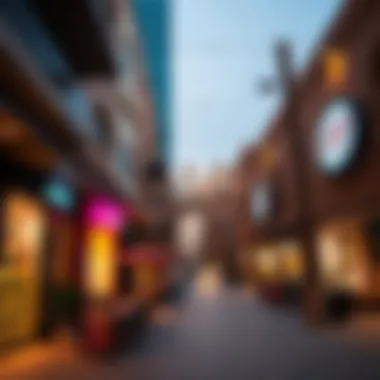
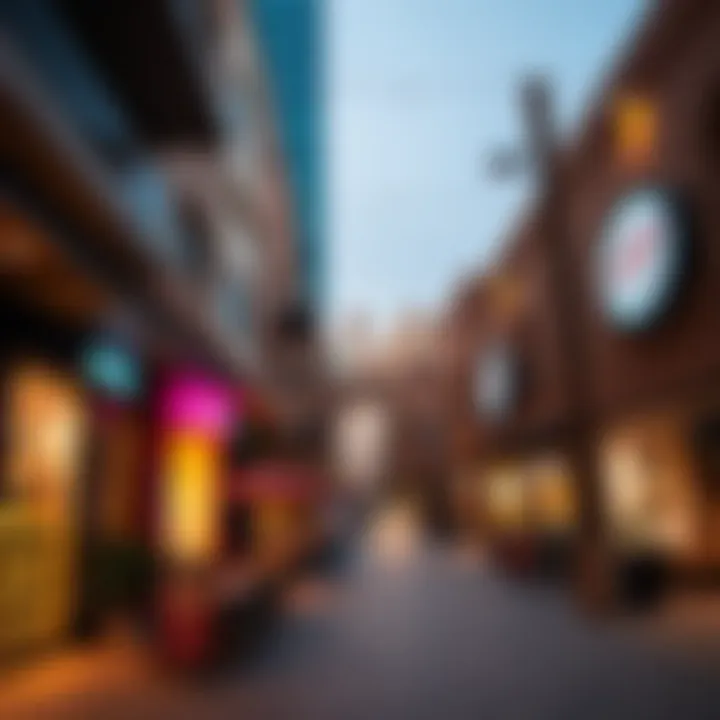
The real estate influence surrounding Naif Souq is pronounced in the residential sector too. As business activities thrive, the demand for housing increases. This increased demand tends to elevate property values, creating attractive scenarios for landlords and homeowners alike. The accessible amenities and lively atmosphere near Naif Souq often appeal to expats looking to set roots in Dubai, further driving up real estate prices.
Key factors affecting residential property values include:
- Proximity to Commercial Activities: Homes close to the souq often carry a premium due to their location.
- Cultural Appeal: Living near a site steeped in tradition often attracts individuals looking to immerse themselves in the local culture.
- Amenities and Infrastructure: The growth in supporting infrastructure, like schools, hospitals, and recreational areas, also resonates with potential homeowners.
Those looking to invest should also note the impacts of urban developments on residential properties. New residential projects tend to follow commercial upgrades to maintain a balanced and appealing living environment. Thus, areas surrounding Naif Souq are seeing a blend of modern housing complexes that resonate with traditional aesthetics, making them not just a living space but a lifestyle choice.
In summary, the interplay between Naif Souq’s commercial vibrancy and the residential landscape forms a distinct real estate narrative that offers significant insights for prospective investors and homebuyers alike. As property values climb, so do opportunities for savvy investors willing to navigate this intricate market.
Naif Souq's Role in Dubai's Economy
Naif Souq isn’t just a bustling marketplace; it plays a vital part in the economy of Dubai, one that echoes its cultural richness and dynamism. This souq acts as a commercial nexus where tradition meets modernity, driving retail and employment opportunities. Recognizing its contribution helps to appreciate the broader implications for investors, expatriates, and local businesses alike.
Contribution to Retail Sector
The retail scene in Dubai is marked by its grand malls and luxury boutiques, yet Naif Souq offers something distinct. It serves as a hub for small-scale vendors, promoting local craftsmanship and traditional products. Shoppers flock here not just for bargains, but for unique finds that range from textiles to spices. This local flavor gives Naif Souq a competitive edge, attracting not only expatriates but also tourists seeking authenticity away from mainstream shopping avenues.
Moreover, the souq represents a significant segment of Dubai’s retail sector, contributing to its economic diversity. With over 400 shops, Naif Souq's versatility caters to various consumer needs while maintaining connections to the local community. This creates a ripple effect; as sales increase, vendor profits rise, fostering loyalty among buyers and infusing money back into the economy.
Key Highlights:
- Unique Retail Mix: Offers traditional and modern products that attract diverse customer demographics.
- Affordability: Competitive pricing compared to luxury retail outlets enhances accessibility.
- Cultural Exchange: A melting pot of cultures, drawing both locals and tourists in search of genuine experiences.
Employment Opportunities Generated
As the old saying goes, every cloud has a silver lining. In the case of Naif Souq, the old marketplace creates numerous employment opportunities, which play a crucial role in supporting the local workforce. The souq employs various segments of the population—from artisans and craftsmen to shopkeepers and food stall operators.
Small businesses thrive in Naif Souq, allowing budding entrepreneurs to get their feet wet in the retail world. This is especially significant for the expatriate community, many of whom find their niche here, contributing to their economic stability.
Employment Insights:
- Job Creation: Regular foot traffic leads to increased hiring for various roles within the souq.
- Skill Development: Workers get invaluable experience in customer service, sales, and management.
- Support for Local Talent: By nurturing crafts and trades, the souq bolsters local artisans, ensuring their skills are passed down through generations.
Naif Souq stands as a testament to the resilience of Dubai's local businesses, proving that even amid rapid urban growth, tradition and community can flourish side by side.
In summary, Naif Souq is far more than a collection of shops; it forms the backbone of Dubai's economic framework through retail contributions and job creation. It encourages interaction, promotes cultural narratives, and enhances the livelihoods of those who walk its vibrant hallways.
Future Outlook for Naif Souq
The future of Naif Souq stands at the crossroads of tradition and innovation. As an emblem of Dubai’s vibrant past, its evolution is critical for investors, retailers, and visitors alike. Given the increasing interest in authentic cultural experiences, Naif Souq is set to remain a significant player in the city’s commercial narrative. Understanding potential shifts in the retail landscape and recognizing the challenges ahead will be essential for stakeholders looking to engage with this unique marketplace.
Expected Changes in Retail Pattern
As technology permeates every aspect of commerce, one can expect Naif Souq to adapt its retail patterns to stay relevant. For example:
- Integration of E-commerce: While Naif Souq thrives on the allure of face-to-face shopping, the potential for online integration cannot be overlooked. Having a digital presence might not only attract the tech-savvy young crowd but also help local merchants reach out to a wider audience beyond geographical confines.
- Hybrid Shopping Experiences: Combining traditional market ambiance with modern conveniences, such as mobile payment systems and virtual tours, could transform how shoppers perceive the souq. Imagine feeling the textures of traditional fabrics through augmented reality while sipping on a local brew – that’s a future that’s not too far away.
- Sustainability and Local Sourcing: With growing consumer awareness regarding sustainable practices, there might be an increasing demand for products that celebrate local craftsmanship and eco-friendly practices. Shops showcasing locally-sourced goods could become the heart of Naif’s evolving retail environment.
Adapting to these trends will not only help in maintaining its charm but also in ensuring the souq remains a must-visit destination for countless visitors.
Potential Challenges Ahead
However, the path to transformation isn’t without its hurdles. The future outlook for Naif Souq must also account for challenges that could impede growth:
- Market Competition: The influx of online shopping and modern shopping malls in Dubai can draw potential customers away from traditional souqs. Keeping Naif Souq attractive in the face of such competition requires innovative marketing strategies and potentially, collaborations with modern retailers.
- Preserving Tradition: As modernization sweeps across Dubai, there's a fine line between embracing change and losing the essence of what makes Naif Souq special. Careful planning will be necessary to preserve the unique cultural identity while still encouraging growth.
- Economic Fluctuations: Economic disruption, possibly due to global events or shifting consumer habits, could pose threats to the viability of sustained growth. Market players must remain adaptable to navigate through tightening budgets and shifting priorities of customers.
"While the future may seem bright, it calls for vigilance and a strategic approach to tackle potential pitfalls."
In a nutshell, the outlook for Naif Souq reflects a blend of promise and challenge, hinged on the ability to innovate while respecting its cherished heritage. Investors, merchants, and local stakeholders must closely monitor evolving trends to ensure a thriving marketplace for years to come.
Ending: The Enduring Legacy of Naif Souq
Naif Souq stands as more than just a traditional marketplace; its enduring legacy shapes both the cultural and commercial fabric of Dubai. As we reflect on its historical significance, architectural charm, and diverse offerings, it becomes evident that Naif Souq is a microcosm of the city's evolution, intertwining the past with the modern.
The souq represents a tapestry of history and modern life. Once a pivotal trade hub, it has adapted to the changing economic landscape, embracing new trends while still preserving its core identity. The shops here, each a small world of its own, carry whispers of the past through the products they display. From aromatic spices to intricate handicrafts, the goods sold are laden with stories, connecting visitors with the rich heritage of the region. This deep-rooted connection to local traditions appeals to both expatriates seeking authenticity and tourists eager to experience the real Dubai.
Furthermore, Naif Souq's ongoing resilience in the face of e-commerce trends signals an adaptable spirit. Despite the proliferation of online shopping, the vibrant atmosphere of this souq compels shoppers to physically engage with their purchases. The excitement of haggling, the sensory overload of sights and smells, and personal interactions with vendor create an experience that screens just cannot replicate.
Economic Significance
In the broader context of Dubai's economy, Naif Souq plays a crucial role. It not only contributes to the retail sector but also provides numerous employment opportunities, reinforcing its significance as a commercial nucleus wherever you look. Local entrepreneurs thrive here, showcasing their crafts and establishing ventures that can flourish with solid community support. This locality not only enriches the lives of its citizens but also strengthens the economic bonds within the region.
Future Considerations
As Dubai looks towards the future, the evolution of Naif Souq will undoubtedly continue. Revitalization efforts should balance modernization with the preservation of culture, ensuring that the essence of this historic marketplace remains intact. Investors and city planners must work jointly to foster an environment that respects tradition while embracing innovation. Navigating these prospects effectively will be imperative to keeping Naif Souq a vibrant part of the community.
In summary, Naif Souq encapsulates a living history that is both ingrained in Dubai's identity and reflective of its dynamic progress. As the nexus of culture and commerce, it invites us all to explore, engage, and appreciate the legacy that continues to shape this remarkable city. The charm of Naif Souq lies not just in what is sold but in the stories and experiences held within its bustling corridors. Whether a local or a visitor, stepping into Naif is stepping into a narrative centuries in the making, ensuring this truly is a place where history meets modernity.
“Naif Souq is not just a marketplace; it’s an experience that embodies the spirit of Dubai.”
For further insights into Dubai's thriving economy and cultural landscape, consider visiting resources like Dubai Tourism and Dubai Economy. These sites offer extensive information on what makes this city a unique intersection of history and future.



